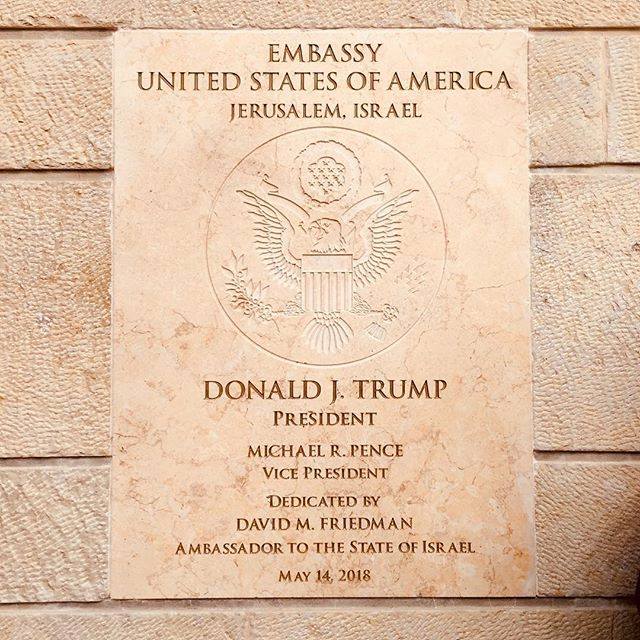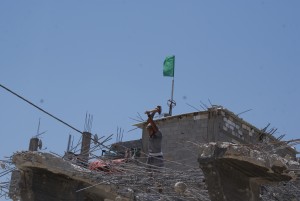Diagonosing the Jerusalem embassy syndrome
By Khaled Diab
The problem is not the new US embassy in Jerusalem. The problem is the reality which surrounds and underpins it.

Image source: US embassy in Jerusalem's Facebook page
Friday 18 May 2018
“Remember this moment, this is history,” Israeli prime minister Binyamin Netanyahu urged the high-flying audience at the inauguration of the US embassy in Jerusalem, while less than 100 km away Israeli snipers were killing dozens of unarmed Palestinian protesters in Gaza and maiming hundreds more. “President Trump, by recognising history, you have made history.”
Netanyahu has set the bar for making history incredibly low. All Donald Trump had to do was install a new plaque reading “embassy” at the US consulate in Arnona, West Jerusalem, get his daughter, Ivanka, to unveil it and, hey presto, “history”.
This is not unlike how Trump operated as an entrepreneur: plonk a sign bearing his name on a skyscraper or casino and, like a conjurer, give the illusion of change without actually changing anything of substance. With Trump, politics and business are all about branding.
The illusion that Trump has made history is aided not just by his cheerleaders but also by his opponents. This is partly because ‘The Donald' is a dangerously foolish and foolishly dangerous man, but also because he presents a unique opportunity for his predecessors to cover up their own failings by blaming everything on him.
But Trump was not the one who stood idly by and watched as Israel annexed historical Jerusalem and large swathes of the surrounding West Bank and made it their capital. Settlement building in East Jerusalem did not start on Trump's watch nor did the construction of the wall splitting East Jerusalem from the rest of the West Bank, neither did the demolition of Palestinian homes and the eviction of their tenants. Moreover, the US has officially recognised Jerusalem as the capital of Israel for nearly a quarter of a century, since the 1995 Jerusalem Embassy Act, so Trump recognising Jerusalem as Israel's capital is hardly news or new.
This partly explains why the inauguration of the US embassy met with a rather muted response from Palestinian Jerusalemites, not because they are indifferent to their plight but because this minor symbol does not change their situation beyond the symbolic, as a Palestinian colleague from Jerusalem explained. After all, the reality the inauguration represents is one they have been living since 1967 and in accelerated form since the Oslo process began in the 1990s.
Even what has been dubbed as the Great Return March in Gaza to mark seven decades of dispossession, though it was refocused on Jerusalem this week, is only ostensibly and symbolically about the holy city. The demonstrations on Monday, during which Israeli snipers killed at least 58 unarmed Palestinians and wounded hundreds more, were far more about the Israeli blockade of Gaza and the destitution and despair it has created. And it is this massacre of protesters and the incarceration of an entire population which should be the main focus of our outrage.
The mounting death toll in Gaza is causing indignation and anger among Jerusalem's Palestinians. “It takes unbelievable evilness and a wilful blindness to Palestinian humanity and rights to celebrate the opening of the US embassy in occupied Jerusalem while Israeli troops gun down unarmed people in Gaza,” reflects the prominent Italian-Palestinian journalist and author Rula Jebreal. “East Jerusalem mourns, Palestinian Muslims and Christians mourn their subjugation.”
While the rehousing of the embassy changes nothing of substance, Donald Trump's presence in the White House and his ending of any pretence that America is a broker, let alone an honest broker, has galvanised Israel's extremist government and Israeli extremists, who felt somewhat constrained under his predecessor, Barack Obama, despite his lopsided and ineffectual efforts to broker a deal and his staunch support, in words and deeds, for Israel.
Nevertheless, even during these dark and embattled hours, many Palestinian Jerusalemites clasp on to a sense of hope beyond the current despair. “I crave a peace plan where all communities live side by side as equals,” Rula Jebreal dreams.
Such a utopian future of equality is unlikely to come from the leadership, at least none that is currently on the horizon. “Have hope, and faith, not in governments, but in people,” Mahmoud Muna of East Jerusalem's well-known Educational Bookshop wrote in a public post on Facebook. “Our freedom is not awaiting permission from no one, it is coming and without a knock on the door, it will just come.”
For many years, I have been advocating for a people's peace achieved through a civil rights struggle for equality because the two-state solution is dead and because America will not bring peace, the Israeli government will not bring peace, and neither Fatah nor Hamas will bring peace. What will bring peace are the peace-lovers in Israel and Palestine joining forces. Only then will peace stand a chance.
—-
An Italian version of this article first appeared in Corriere della Sera on 16 May 2018.


